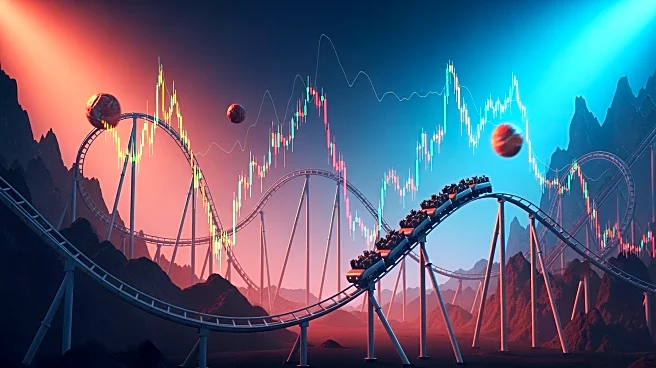What's Happening?
Beyond Meat (NASDAQ:BYND) has seen a dramatic fluctuation in its stock price, surging from $0.50 to $7.69 per share within a week, marking a 1,438% increase. This rise was driven by its inclusion in the Roundhill Meme Stock ETF, an expanded partnership
with Walmart to offer a new Beyond Burger 6-pack in over 2,000 stores, and recognition by Bank of America as a Reddit meme stock to watch. The primary catalyst for this surge was a short squeeze, where high short interest forced sellers to cover positions, amplifying the rally. However, the stock has since fallen nearly 20% to below $2.90 per share, raising questions about the sustainability of the meme-driven rally.
Why It's Important?
The volatility in Beyond Meat's stock highlights the risks associated with meme stocks, which often experience rapid price changes driven by social media hype rather than company fundamentals. Investors chasing these stocks may face significant losses when the momentum fades. Beyond Meat's business fundamentals are concerning, with a reported 20% year-over-year revenue decline and ongoing losses. The plant-based meat sector faces challenges such as high production costs, competition, and declining consumer demand. The recent stock movements underscore the speculative nature of meme stocks and the potential financial risks for investors.
What's Next?
The future of Beyond Meat's stock remains uncertain, as the company continues to grapple with declining sales and market challenges. While the Walmart partnership may increase visibility, it is unlikely to reverse the downward trend in demand for plant-based meat. Investors should be cautious of further volatility and consider the company's fundamentals before making investment decisions. The stock may experience additional fluctuations as Reddit traders continue to rally around it, but long-term prospects remain bleak without substantial improvements in business performance.
Beyond the Headlines
The meme stock phenomenon raises broader questions about market dynamics and investor behavior. The reliance on social media-driven hype rather than financial health can lead to unsustainable stock valuations and market instability. This trend reflects a shift in how retail investors engage with the stock market, prioritizing short-term gains over long-term investment strategies. The ethical implications of promoting stocks with weak fundamentals also warrant consideration, as it can lead to significant financial losses for uninformed investors.















